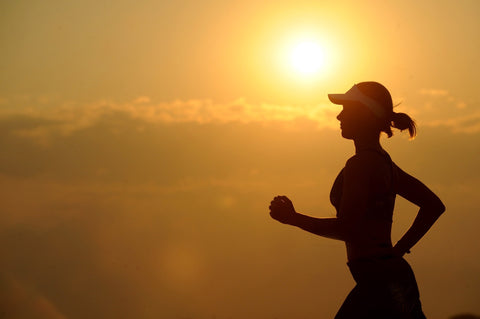Food, Caffeine, Exercise – Oh My!
Three forces, in addition to sunlight viewing, that will set your internal clock off right
The body is a magical thing. There are mind-boggling processes and functions happening inside us, responsible for keeping us alive and healthy and happy. It’s beautiful to think of these systems happening in tandem, working together, making each other better by the day.
We all know that a harmonious diet and fulfilling exercise is key to a healthy body and mind, key to our bodily mechanisms running smoothly and efficiently. But did you know that food and exercise can also be a determining factor in setting your circadian clock, and thus the quality of your sleep and energy throughout the day?
Getting proper sleep has an outsized impact on functions and processes throughout the entire body. Countless studies have shown that good sleep is one of the most important factors in good health. Sleep is dictated by your circadian clock, also known as the suprachiasmatic nucleus – the rhythm in which your body alternates cortisol and melatonin to keep you awake during the day and asleep at night. Viewing the sunlight through the neurons in our eyes – melanopsin ganglion cells – in the morning and evening is the most direct and effective way to set and maintain your circadian clock. Because our eyes were designed with this purpose, sunlight viewing will always be primary and priority.

But in addition to light, there are a few other ways to help regulate your circadian clock, and thus your sleep.
These other factors are controlled by a tiny mechanism that sits right above the roof of your mouth called the intergeniculate leaflet. Its responsibility is to regulate the circadian clock output through non-photic influences, or any forces other than light, such as exercising, food, and more. In conjunction with sunlight viewing, these forces can help maintain our levels of cortisol and melatonin, and keep us lively and awake throughout the day.
The first non-photic influence is food. While we always recommend a healthy, balanced breakfast, when it comes to setting our circadian clock, it’s less about what you eat and more and when you eat it. Eating early in the day triggers the metabolism, increases the body temperature, and supports the circadian clock mechanisms to make you more alert throughout the day. Early eating helps to set a food-entrained circadian clock.

The volume that you eat also affects your cortisol and melatonin balance throughout the day. If you’ve ever felt sleepy after enjoying a big meal, it’s because your body is diverting blood and critical resources away from other organs, leaving you with a dip in energy. To avoid a crash, consume meals that make you properly nourished, but not overly stuffed.
The second non-photic influence is caffeine. Caffeine is an adenosine antagonist. With a regulated circadian clock, adenosine keeps you awake by continuing to build throughout the day. To properly leverage caffeine in a way that encourages wakefulness and discourages the dreaded afternoon crash, it’s recommended to wait to consume your caffeine 90-120 minutes after waking. It’s also highly recommended to drink your coffee or tea no later than 2 pm as studies have shown how caffeine intake late in the day can completely disrupt the architecture of your sleep.

The third non-photic influence is exercise. Exercising in the first hour after waking increases body temperature, helping to set your circadian rhythm, increasing cortisol and decreasing melatonin levels to kick off your day. All movement is good for your body, but If you exercise in the evening, because of this temperature and cortisol increase, you might find yourself falling asleep later in the night.

These factors will undoubtedly, positively affect your functions and help you sleep better. However, sunlight viewing is 1,000 to 10,000 times more effective than any of these, which reinforces the importance of creating a sunlight viewing habit in your life. Light, food, caffeine, and exercise can work together, creating a beautiful harmony, to help your circadian clock sing.
